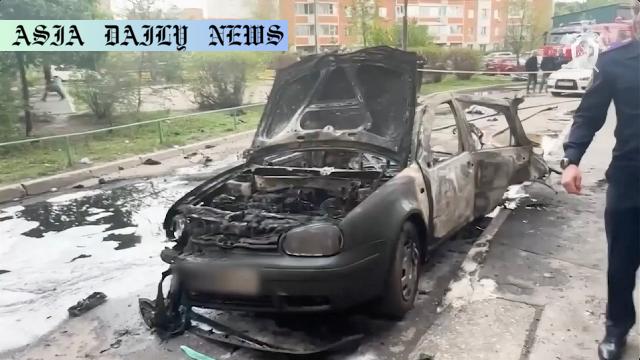Ukrainian agent detained over car blast that killed Russian general
A Ukrainian agent has been detained by Russian authorities in relation to a car explosion.
Lieutenant General Yaroslav Moskalik was killed in the Moscow incident.
The FSB alleges the explosive device was remotely detonated from Ukraine.

FSB Announces Arrest of Ukrainian Agent for Moscow Car Blast
Russian authorities have detained a man alleged to be an agent of Ukrainian special services in connection with a car explosion in a Moscow suburb. The detonation, which occurred on Friday, resulted in the tragic death of Lieutenant General Yaroslav Moskalik, who served as the deputy chief of the Main Operational Directorate of the General Staff of the Russian Armed Forces. The incident has captured attention, with questions being raised about the security measures in place and the ongoing geopolitical tensions between Russia and Ukraine.
Details of the Incident Plotted in Moscow
The Federal Security Service (FSB) of Russia released a statement asserting that the detained suspect is in his 40s and played a pivotal role in orchestrating the deadly explosion. According to the FSB, the suspect gained access to explosive materials from a cache arranged by Ukrainian special services located in the Moscow region. These components were then allegedly assembled into a functional explosive device, which was discreetly planted in Moskalik’s vehicle. It was confirmed that the detonation was executed remotely from Ukraine, marking yet another high-profile attack amidst ongoing hostilities between the nations.
Mounting Tensions and Patterns of Explosions
This event is part of a growing series of explosions and incidents on Russian soil, which have raised alarm bells within the nation since the conflict with Ukraine escalated. This is not the first time Russian military personnel have been targeted. In December of last year, two high-ranking military officers were killed in a blast in Moscow, adding to the sense of unease and concern across the region. These repeated security breaches highlight broader vulnerabilities and the increasing complexity of the Russia-Ukraine conflict.
Wider Implications on Geopolitical Relations
The killing of a high-ranking officer such as Lieutenant General Moskalik underscores the evolving intensity of the ongoing war. Events like this not only deepen distrust but also complicate any potential avenues for diplomatic solutions. For Russia, this incident further propels national security discussions and accentuates the need for more stringent safety protocols for its high-ranking officials. Meanwhile, Ukraine continues to allege that these actions serve as provocations, intensifying animosity while challenging the global community’s calls for peace and resolution.
With no resolution in sight, the ramifications of such incidents are bound to resonate far beyond the immediate consequences. As both Russia and Ukraine brace themselves for further escalations, the international community must grapple with the geopolitical dangers of a protracted conflict. Consequently, news like this shines a light on a broader narrative of unchecked tension and its global repercussions.
Commentary
The Complexity of Intelligence and Warfare
The arrest of a Ukrainian agent accused of orchestrating a car explosion in Moscow opens a deeper conversation about the evolving nature of modern warfare. Today, intelligence and covert operations play as significant a role as direct military engagement. The use of remotely triggered explosive devices underscores the technological advancements in warfare strategies, allowing nations or groups to influence events far removed from their immediate territories. This incident also brings to light how intelligence countermeasures must consistently evolve to address these emerging tactics, ensuring the safety of key assets and personnel even deep within national borders.
Human Cost Amidst Political Strife
While geopolitical tensions often form the center of news headlines, incidents like these also highlight the devastating human cost of conflict. Lieutenant General Yaroslav Moskalik was not just a high-ranking officer but also an individual intertwined with the lives of his family, colleagues, and community. His death serves as a stark reminder that the repercussions of such conflicts ripple far beyond political or military objectives. As tensions between Russia and Ukraine continue to escalate, it is crucial to address not just the political ramifications but also the personal tragedies that accompany such complex geopolitical events.
Long-Term Implications for Ukraine-Russia Relations
Incidents like this undermine any potential for dialogue and peaceful resolutions, further embedding division and animosity. For Ukraine, allegations of orchestrating such acts could solidify Russia’s public narrative of external aggression, regardless of their factual accuracy. For Russia, the consistent targeting of high-level personnel may push it toward more aggressive policies not only toward Ukraine but also in its engagement with Western allies. The current divide between these nations is emblematic of broader geopolitical struggles that have repercussions far beyond their immediate borders.
Ultimately, it is the responsibility of the international community to actively work toward mitigating these tensions. The ongoing Russia-Ukraine conflict is not just a regional issue—it is a potential precursor to widespread instability that threatens global security. Reflecting on this arrest and subsequent events should remind us that diplomacy, not escalation, remains the best path forward for sustainable peace.


